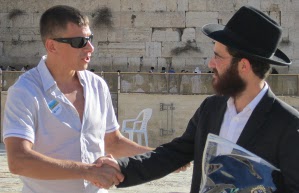 The Ninth of Av is nearly upon us — the saddest day on the Jewish calendar, the date when both Temples were destroyed and many other tragedies occurred. The Rabbis teach that while the First Temple was destroyed because of immorality, the Second Temple was destroyed simply because of needless hatred between us. We celebrated division and discord, rather than coming together.
The Ninth of Av is nearly upon us — the saddest day on the Jewish calendar, the date when both Temples were destroyed and many other tragedies occurred. The Rabbis teach that while the First Temple was destroyed because of immorality, the Second Temple was destroyed simply because of needless hatred between us. We celebrated division and discord, rather than coming together.
In recent weeks we have seen multiple tragedies: the passing of three of the oldest Torah scholars, who still remembered the level of Torah study common in pre-war European Yeshivos, the stabbing death of an outstanding Sephardi Chacham in Israel, and, most painful of all, the horrific murder of an eight-year-old boy in Brooklyn. The last of these truly brought us together, as people from all walks of Jewish life joined together to search for him.
The Torah reading scheduled to precede the Ninth of Av is always the beginning of Devarim [Deuteronomy]. The first word of the Book of Lamentations, Eichah, appears in Deuteronomy 1:12: “Eichah, How, can I alone carry your toil, your burden and your argument?” The dissent and discord are the same that led to destruction.
As we approach the Ninth of Av, it’s appropriate to consider: what can we do to increase love rather than hate, to come together instead of splitting apart? Why must it take a tragedy to unite us? Let it not just be a time to cry about the past, but to think about a brighter future.




Dear Rabbi Azriel Schreiber,
Do we not read in Deuteronomy that the Law of G-d is perfect? Are we not taught that it Torah is in a form that is understandable to everyone? The idea that the first explanation of the story of the spies or any other story was not understandable the first time and needs clarification violates this. If it wasn’t understandable, it could’ve been edited out. There is enough editing in the Torah that an unclear explanation could’ve been deleted. If it has to be edited so the average person cannot understand it, then the Law of G-d as written isn’t perfect…and needs editing. Hence, change is permissible.
Regarding the 21 days, I observe the numerous questions about the proper way to observe mourning rites. To equate it with shiva may make the task for teachers easier. If it is different, this would need to be explained. For example, the idea that the more intense mourning, shiva, is followed by a less intense mourning period, sh’loshim before returning to normal life. Here, it is reversed. Also, the 30 day period is only 21 because that is the length of time between the two observances. But the more intense period of mourning is lengthened to nine days from seven rather than kept the same or shortened as the entire period is less. Is there tie between this and the time period between Rosh Hashana and Yom Kippur? If so, the first of Av may warrant some additional attention. If not, then…change is permissible.
I feel that explanations I see on this and other websites like it are severely lacking for continuity and consistency. If it means I lack the faith, then so be it. If you will give my views some validity, then I hope some scholarly discussion will follow. It can only help to facilitate the understanding of so many other Jews searching for meaning.
Thanks for sharing your comments.
I believe you’re commenting on this post. I understand your concern about the Torah not appearing perfect. The author of the response meant to say that the full story of the spies is elucidated by reading the account of the event as recorded in all the places it’s mentioned in the Torah. The Torah remains perfect since clarity is attained by reading the entire Torah. Reading only a part of the Torah’s account would understandably leave the full picture unclear. At the same time, G-d chose to write the story of the spies in 2 places and we can assume that He did so for a specific reason.
The contrast between the 3 week mourning period and the personal mourning with sitting Shiva one does for a relative is interesting, and one that I have heard explained. Unfortunately I don’t recall the explanations off-hand, but I’m pretty sure I’ve seen it discussed in the writings of Rav Shimshon Pincus and the Nesivos Shalom.
You’re raising some excellent points and by no means are sharp questions a sign of lack of faith! If that were true, your average Rabbinical college would be a house of heretics; in their study halls the greatest honors are given to those who come up with the sharpest questions! Questions are strongly encouraged and they’re the greatest key to true Torah study that I know of.
I agree with you without any iota of a doubt, that we should set apart our differences in religious belief, or political affiliation but rather work together if we really love that lasting peace that we’d been looking for. “For I know what plans I have in mind for you, says G-d, plans for well being, not for bad things; so that you can have hope and a future.” Yirmeyahu 29:11, Shalom. Bro. F. C. Rola